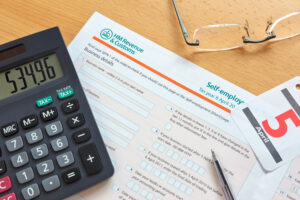<?xml encoding=”utf-8″ ?????????>
With only eight days remaining until the deadline, there are still around 4 million individuals who have not yet submitted their self-assessment tax return.
In response, HM Revenue and Customs has issued a call to action, urging people to take immediate action. Failure to meet the deadline could result in penalties, including a high late payment interest rate of 7.75%, potentially leading to a significant profit for HMRC, according to accountants.
The expected number of tax returns to be filed by January 31st for the 2022-2023 tax year is over 12.1 million. As of January 9th, HMRC reported that 5.1 million taxpayers had not yet filed, and by January 23rd, that number had decreased to 3.8 million.
In a release headlined “Less distraction, more action!,” the tax collector said those who had yet to tackle their form “are urged to act now or risk facing a £100 penalty”.
A late tax return will incur an immediate £100 fixed penalty, which applies even if there is no tax to pay or the tax bill is paid on time. After three months there are additional penalties of £10 a day, up to a maximum of £900, with further penalties after that.
There are also penalties for any tax that is paid late, with interest charged as well. This late payment interest rate was last year lifted to 7.75% – the highest rate since early January 2008, when it was 8.5%.
Myrtle Lloyd, HMRC’s director general for customer services, said: “If you are a self-assessment taxpayer, now is the time to take action and get your return done.”
Last year about 600,000 customers missed the 31 January deadline, with 2 million late with their filing in 2022.
The numbers affected by self-assessment have grown over the years: a decade ago it was a little over 10 million, climbing to 11.4 million by 2018.
There could be thousands of people who have been drawn into the self-assessment net for the first time in the 2022-23 tax year, said accountancy firm BDO. Many may be unaware of their obligations to file a return and could run the risk of penalties.
“These new filers could include parents claiming child benefit whose salaries crossed the £50,000 threshold for the first time in the 2022-23 tax year and who will have to repay some or all of their benefit through the ‘high income child benefit charge’,” said Dawn Register, head of tax dispute resolution at BDO.
Others could include higher earners whose salaries exceeded £100,000, or pensioners who earned more than the “personal savings allowance” of up to £1,000 of interest because of higher savings rates. Alternatively, they could be working people whose “side hustle” earnings went above £1,000 during the tax year.
BDO said HMRC “could be in line for a windfall in 2024 if people don’t file their tax returns on time”.
It added: “With many more people likely to have crossed the threshold at which they are required to file a tax return, there is a risk of a significant increase in the number of people who don’t meet the 31 January deadline.”
